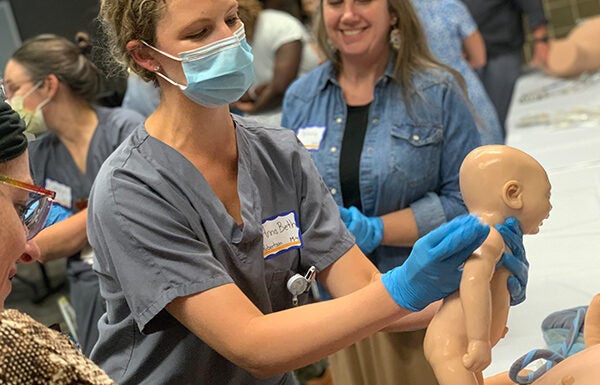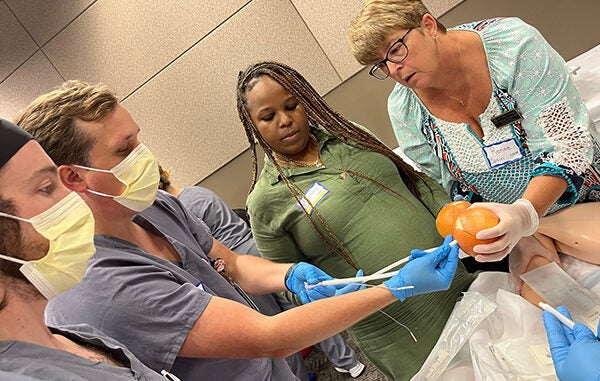Midwifery Grant
Federal grant expands midwifery care for North Carolina
At the end of September, officials at Betsy Johnson Hospital in Harnett County announced they would end labor and delivery services due to “declining demand for maternity services, recruitment challenges and financial realities.” In 2019, a hospital in Murphy ended labor and delivery services, forcing patients to travel an hour to have a baby. It’s an unfortunate trend sweeping across the country.
To help stem the tide, a federal grant will provide East Carolina University’s midwifery program just under $4 million over four years to support students and preceptors, which program directors at ECU say is a game changer, continuing the innovation of rural health care in North Carolina.
Dr. Becky Bagley, the College of Nursing’s midwifery program director, said ECU was one of only eight of the 46 accredited nurse-midwife programs across the country selected for grant support from the federal Health Resources and Services Administration (HRSA).
Three main goals of the college’s plan to implement the funding support are fairly straightforward: increase the number of certified nurse-midwives and diversify the maternal and perinatal health workforce; expand maternal health training and enhance the college’s curriculum; and strengthen community-based training partnerships.

Dr. Becky Bagley, College of Nursing’s midwifery program director, with students during training.
Courtney McRae, a nurse consultant and project officer for HRSA that funded the grant, laments that women are dying in the United States at an alarming rate and that more women are dying from pregnancy related complications than in any other developed country.
According to HRSA figures, rural and underserved areas, like much of North Carolina, see higher maternal mortality, at just under 30 deaths per 100,000 live births, than the rest of the nation at just over 18 per 100,000 live births. Half of counties across the United States lack OB-GYNs and more than half don’t have nurse-midwives.

Dr. Pam Reis, department chair of nursing science.
According to HRSA figures, rural and underserved areas, like much of North Carolina, see higher maternal mortality, at just under 30 deaths per 100,000 live births, than the rest of the nation at just over 18 per 100,000 live births. Half of counties across the United States lack OB-GYNs and more than half don’t have nurse-midwives.
McRae said she is “extremely excited for this maternal care funding opportunity for all of our grantees as they will produce the certified nurse-midwives to combat the awful disparity.”
Students in the program will be required to be full time, which means the class load will make working full time very difficult, which most graduate-level student nurses must do to support themselves and their families, Bagley said. Along with covering tuition, funds from the program, up to $25,000 a year, should give students the option to cut back on their hours at work in order to allow them to focus on the rigors of their classwork and clinical training.
Dr. Pamela Reis, department chair of nursing science and director of the doctoral program, authored the grant and is the project director. She agrees that the grant funding is a huge benefit to help recruit and retain the highest quality preceptors possible.
New Rules
The grant funding comes as midwifery practice has seen a seismic shift with the passing of N.C. Senate Bill 20. Tucked into the provisions of the law, which go into effect in October, is a loosening of the restrictions on independent practice for nurse-midwives in North Carolina. Along with Nebraska and Georgia, North Carolina required midwives to practice under the supervision of a medical doctor until SB 20 became law.
“With the new approval, removing supervision from our state practice law, more midwives will be able to go into the rural communities without having to worry about physician supervision,” Reis said. “The law now requires nurse-midwives to have either 4,000 hours of practice or two years of experience as a midwife, and that removes the requirement to have a physician supervise our practice.”
A significant aspect of the grant is strengthening community-based training partnerships, which translates to paying preceptors to be extensions of the education process in clinics and practices across the state. ECU midwifery students are required to spend 800 hours in a clinical setting before graduation learning the hands-on skills necessary to be an effective health care provider. Currently preceptors are paid a nominal amount, which is a recognition of the importance of their contributions, but Bagley said most serve as preceptors as a service to the future of their profession.

ECU midwifery students train with birthing simulators at the College of Nursing.
With grant funding, preceptors could be paid up to $7,000 for taking an ECU nurse-midwife student under their wing, which is serious money in the world of precepting. Bagley said she isn’t aware of any universities in the nation who pay preceptors that much.

ECU midwifery students train with birthing simulators at the College of Nursing under the tutelage of nursing instructors.
“Prior to the grant some of our preceptors have said, ‘When I have to weigh taking ECU students versus certain private universities that pay $2,000 and you’re paying me $2.34 an hour, you know who I am going to pick,’” Bagley said. “Some of them are very loyal to us because they are ECU graduates and it’s not about the money, or they wouldn’t have taken our students in the first place.
“This grant money will be an incentive to get more preceptors and perhaps have some preceptors take additional students. This will also help with preceptor burnout. When they receive this much money it will make it worth the effort it takes to precept,” Bagley said.
In addition, the college’s faculty will have money to sponsor training and professional development opportunities for practicing nurse-midwives across North Carolina.
“We can pay for training for them. We’ve done a little bit of that in the past, but we’ve not ever really had money. We have had raffles for our preceptors that allowed one or two to attend training with the midwifery students. This grant will allow more educational opportunities for the preceptors,” Bagley said.
More Resources
The funding may free the college to transition a part-time instructor into permanent status which would help, but isn’t assured. With only two full-time faculty members and two part-time instructors, the workload is already heavy, particularly since there isn’t someone dedicated to managing clinical placement for the program’s students. Bagley, as the program director, had to take on that role in addition to teaching and program oversight responsibilities.
The midwifery faculty just interviewed and accepted 19 new students to start the program in January. Six will be added into the class of 2026, increasing that cohort to 21, and 13 will be added to the class of 2027, allowing room for more full-time students to be admitted next fall. The grant has allowed ECU to increase the cohort size to 20 or 21 students per graduating class.
One of the unique aspects of ECU’s midwifery program, which its directors hope will induce graduates to practice in rural areas of the state, is a partnership with the College of Business to provide graduates with a basic understanding of how to start and run an independent clinic. The Mini-Midwifery Business Institute has been a success in giving graduates tangible tools to expand health care services in underserved areas.
A recent graduate of the nurse-midwifery program who lives in rural, coastal Carteret County proposed her business plan for a midwifery service to a local physician practice. The physician practice was enthusiastic to not only hire her, but also one of her classmates, to start a midwifery service in the practice, which helps make good on fulfill the university’s goals of public service and regional transformation.
“That’s the kind of thing that we want our students to do, go out and make jobs for themselves,” Bagley said.
The program has seen similar successes from graduates across the state — from the Natural Beginnings Birth Center in Statesville to the midwifery service established at Wayne Women’s Clinic in Goldsboro.
“This is going to be huge for us. Retaining students is a national issue as most have to work to pay their bills and a lot of them have families they are also caring for. This grant will allow students to cut back on their work so they will have more time to focus on school,” Bagley said.
